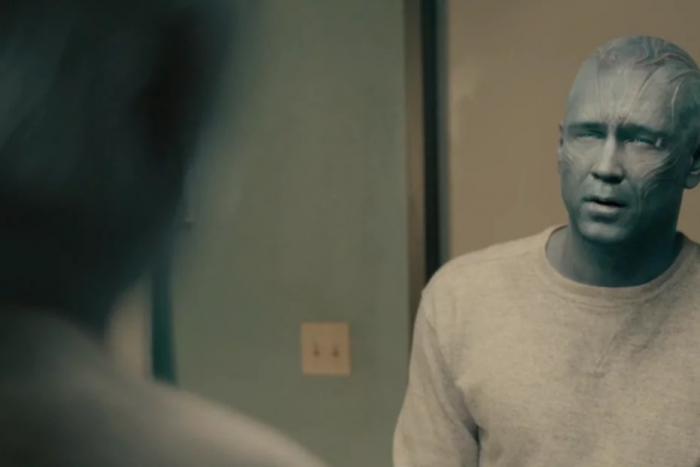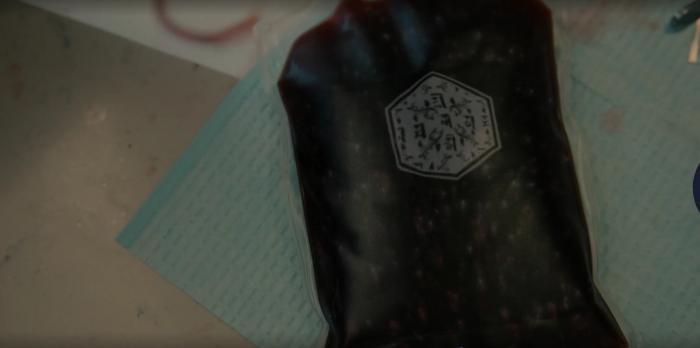

What Is the Twist in Apple TV+'s 'Sugar,' And Does It Work? [Spoilers]
By Chris Revelle | TV | May 6, 2024 |
By Chris Revelle | TV | May 6, 2024 |

We’re in the age of Peak Limited, where limited series have taken the place of films. That’s not an innately bad thing, but there are pitfalls. When a story is executed in a medium that doesn’t best fit its shape, you can imagine the effect as water in a cup: if the cup is too small for the amount of water, it’ll overflow and viewers are left feeling like there’s too much the story wants to do for the size of the vessel. However, if the cup is too big, the amount of water will feel small, and the experience will feel like an under-furnished house if I mix metaphors. In the sixth episode of Sugar, we finally get the twist that the series has been building to and in this reveal, we see that the series is too big a cup for the amount of water it was meant to hold; Sugar is a house made to feel more cavernous for how little furniture populates it.
Beware, past this point are spoilers for Sugar on AppleTV+.
In the final moments of the sixth episode, “Go Home,” we see the real John Sugar: a blue-gray alien with uncannily bright blue eyes with silver accents that suggest they’re mechanical. The symmetrical design of the skin seems to suggest this alien is a construct or a partially robotic humanoid. We see this new face present itself after John shoots up with a vial and syringe that appear to be made of quartz crystal and his human flesh dissolves. I was not the first person to predict this reveal and to the show’s credit, there isn’t a high drama to the sight of Sugar’s true form; the music suffuses the scene with a gentle, contemplative air and John’s exhausted, wistful voiceover frames what we’re seeing as a way to “go home,” at least temporarily. It’s a poetic moment and characteristically poignant as it confirms Sugar’s status as an alien on Earth and invites us to wonder how sad and isolating that feeling may be. With no other knowledge of what Sugar’s home is like, we’re left with the sense that he’s achingly homesick, only more so in the wake of Ruby’s betrayal.

Yes, though we made some of the largest plot moves yet on this show, the mysterious machinations of the Cosmopolitan Polyglot Society and their connection to Olivia’s disappearance remains a mystery to be solved by the rest of the series. After John teleports (?) around Stalling’s safehouse, utterly wrecking him and his goons, he appears at Ruby’s looking for answers. They play a few rounds of Sugar’s favorite game, I Can’t Tell You, before John returns to his home, sad and dejected. Melanie pivoted into being an audience surrogate this episode when she blurted out, “What the fuck is going on?!” after John’s doctor buddy swooped in to give John an IV of blue goop with a sort of sigil-looking label on it. Even as Sugar begins to let us into its real game, it keeps us all at too far a length.

To be clear, I think the twist, that John and the CPS are aliens among us, is a really cool idea to combine with a noir detective story. I am very attracted to stories that are fearless in how they combine elements and I’m very glad Sugar took a big swing. An LA-set noir about a noble-hearted alien who models himself on old Hollywood leading men and can speak (telepathically?) with dogs is absolutely something I would love to watch. I believe this is a matter of choosing the right medium for this story and that Sugar chose wrongly to become a series when it would likely work better as a feature film. The story could work as a series, but only if it had enough subplots to engage with that would make it feel more full. In my view, Sugar has two main plots that it moves between: the case of Olivia Siegel gone missing and the mystery that is John and the CPS at large. The subplots are barely teased-out threads about Olivia and Melanie working with abused women, the general dysfunction of the Siegel family, and a vaguely #MeToo-shaped shadow cast over it all.
There’s nothing wrong with that, per se, but if Sugar wanted to keep things that lean, with the focus squarely on the main plot threads, turning it into a multi-episode series was a strange choice. As I pointed out before, the plot moves at a glacial pace and while the overarching story is very interesting, the way through it has been repetitive. More robust subplots could have helped fill the space and not make the series feel so thin. As it is, it feels like there is not enough plot for this many episodes. What plot is there is very interesting, but there’s not enough happening to fill multiple episodes. I believe that if Sugar was a feature-length film, we would be having a very different conversation.
Sugar keeps things lean and simple, a smart choice for giving an access point to more high-concept elements like “noir but with aliens.” If we apply the same basic story to a 90-minute or 2-hour production, I think the result would likely be a moody, compelling, and inventive film. Colin Farrell’s performance, especially if you go back to watch the older episodes, absolutely sells this twist. Before you have any inkling of his otherworldly nature, Farrell makes sure you know something is strange about him. It takes a lot of control to sell a non-evil take on a “weird stranger,” and Farrell nails it. His work reminds me a lot of Jeff Bridges in Starman where the human-presenting alien is also undeniably strange and yet so endearing.
I think this performance, as well as the elliptically-drawn world of Sugar, would all play much better in a more compressed frame. While the slightly dreamy and elusive tone of the series is intriguing, at some point it begins to wear out its welcome. I think the narrower time strictures of a film are a more appropriate vessel for Sugar than the wide rambling space of a series. The simplicity of its aims doesn’t become stretched into narrative thinness this way and instead of repeating itself to fill time, Sugar’s genuinely cool and inventive ideas won’t lose their luster.
As we get into the endgame of Sugar, I hope the answers to how and why the CPS came together and are doing what they do are satisfying. As I said before, Sugar is a highly enjoyable watching experience. It will then always be a bit bittersweet, knowing the show has great ideas, but maybe didn’t get to show them at their best.
← When Keeping It Real Goes Wrong: Kendrick Lamar vs. Drake | 'The Fall Guy' Is This Year's 'Dungeons and Dragons' →
More Like This
Netflix Attempts to Bring Back the Roast at Tom Brady's Expense
Tom Brady Can't Take A Joke Even When He's Paid To
"Now Where Did I Leave My Keys?"
Dua Lipa Hosts the Season's Worst Episode of 'SNL'
JoJo Siwa Says ‘Dance Moms: The Reunion’ Producers ‘Tried to Do Some Shady S—t’

Chris Pine Used to Be So Broke, His ‘Princess Diaries 2’ Pay ‘Was Absolutely Earth Shattering’
'Black Panther' Star Would Love To Play Batman
Robin Williams Stepped in When One of the ‘Mrs. Doubtfire’ Kids Got Kicked Out of School
Tom Brady Can't Take A Joke Even When He's Paid To
Kristi Noem Wants to Shoot Joe Biden’s Dog Now
Tiffany Haddish Wanted To Sleep With Henry Cavill Until She Met Him
More Like This
Netflix Attempts to Bring Back the Roast at Tom Brady's Expense
Tom Brady Can't Take A Joke Even When He's Paid To
"Now Where Did I Leave My Keys?"
Dua Lipa Hosts the Season's Worst Episode of 'SNL'
JoJo Siwa Says ‘Dance Moms: The Reunion’ Producers ‘Tried to Do Some Shady S—t’
Reviews